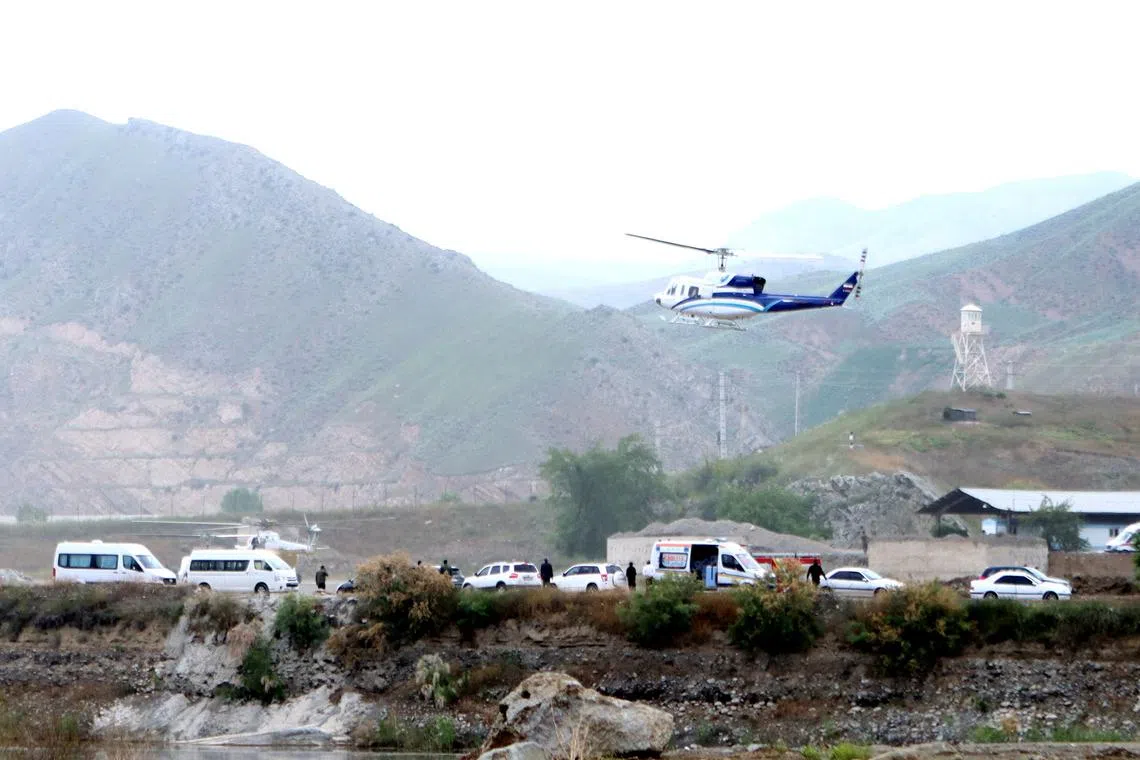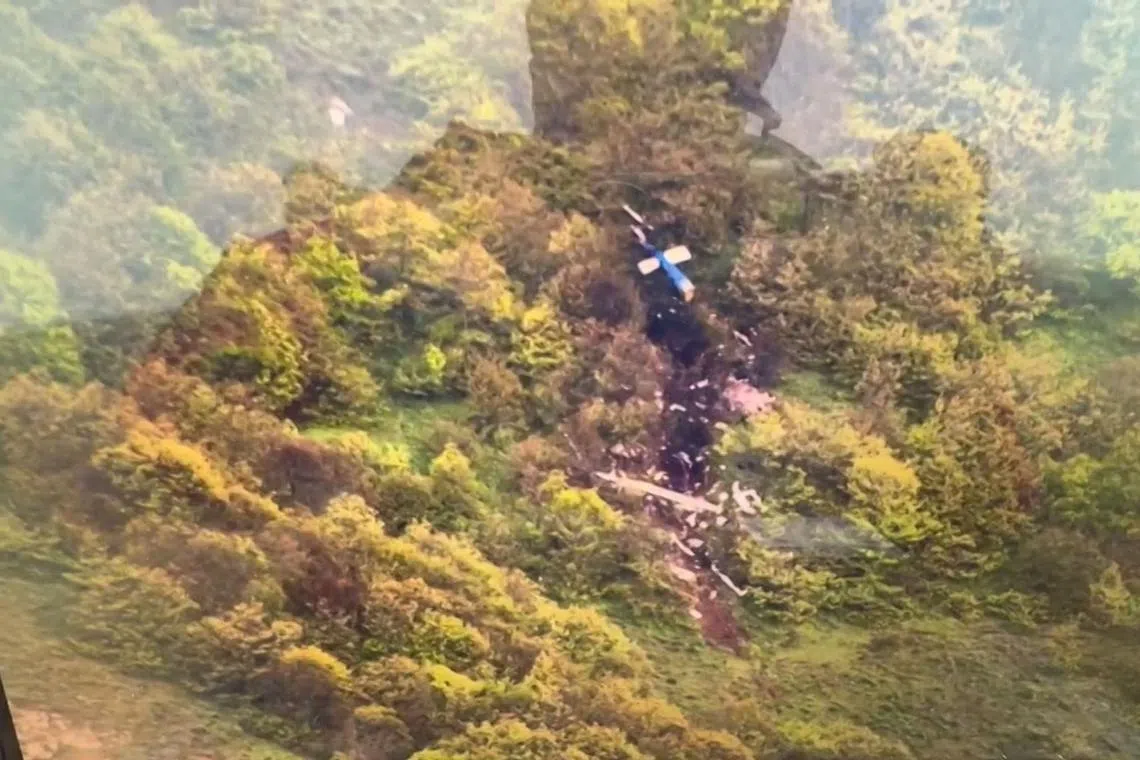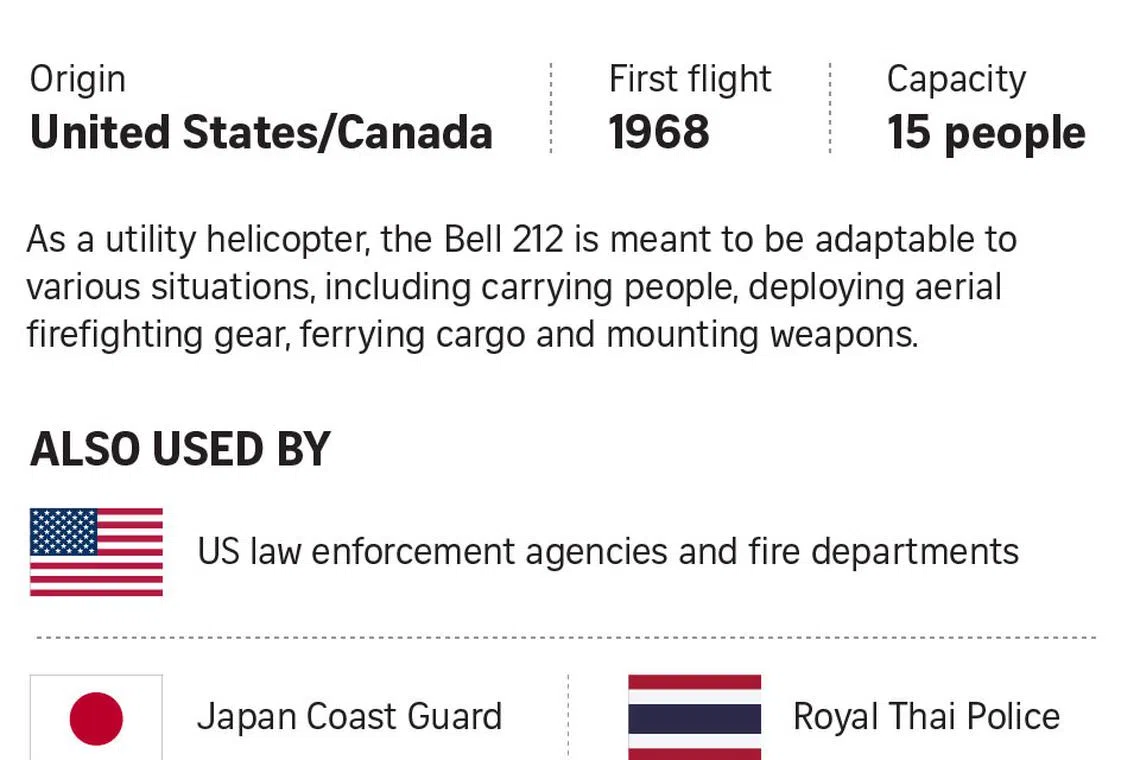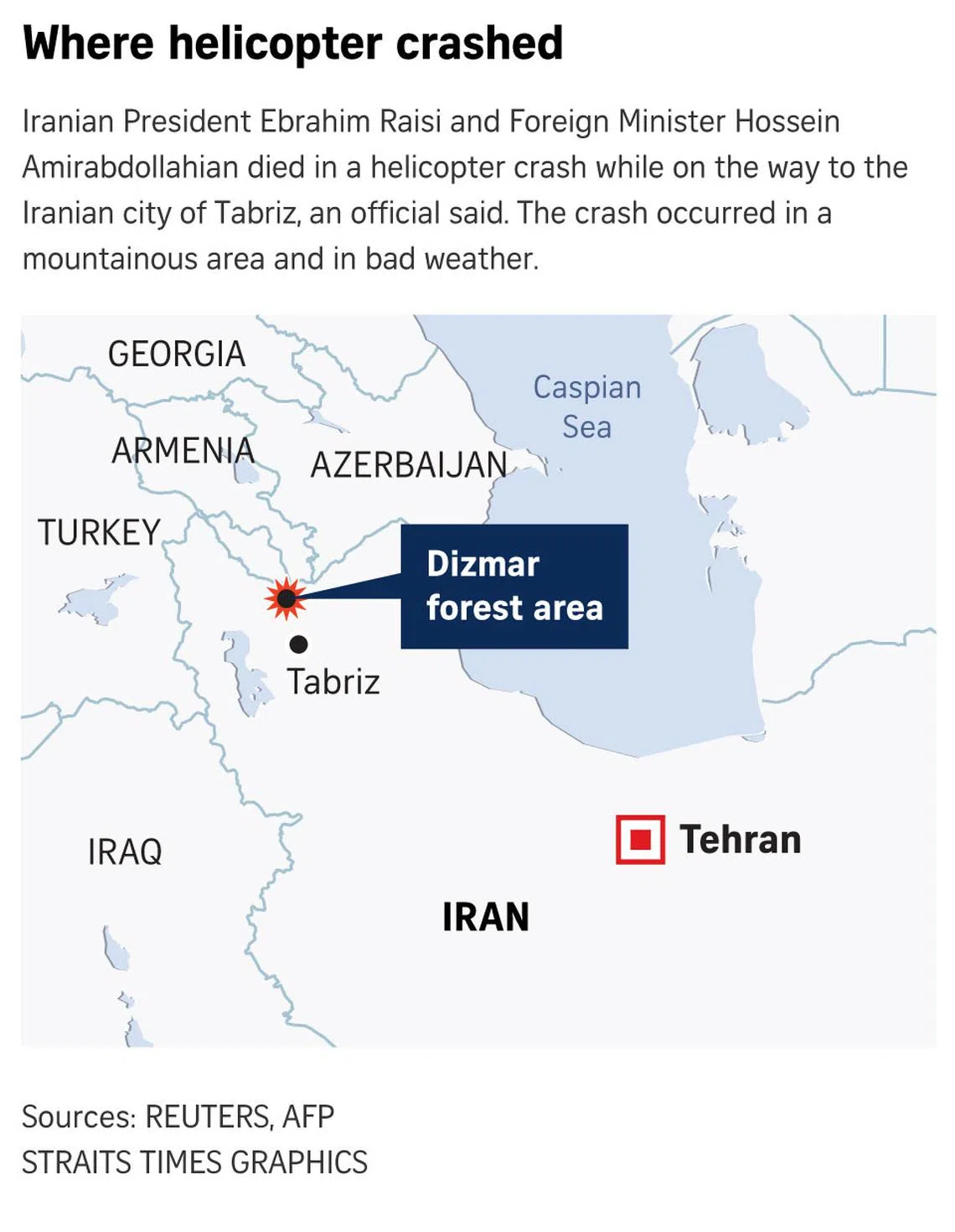Iran’s President Ebrahim Raisi, foreign minister killed in helicopter crash
Sign up now: Get ST's newsletters delivered to your inbox
TEHRAN – Iranian President Ebrahim Raisi, a hardliner seen as a potential successor to Supreme Leader Ali Khamenei, was killed in a helicopter crash in mountainous terrain near the Azerbaijan border, officials and state media said on May 20.
The charred wreckage of the helicopter, which crashed on May 19 carrying Mr Raisi, Foreign Minister Hossein Amirabdollahian and six other passengers and crew, was found early on May 20 after an overnight search in blizzard conditions.
Ayatollah Khamenei, who holds ultimate power with a final say on foreign policy and Iran’s nuclear programme, expressed his condolences for the “martyrdom” of Mr Raisi and his companions, state media reported.
Mr Khamenei had earlier sought to reassure Iranians, saying there would be no disruption to state affairs. He announced five days of public mourning.
Iran’s three branches of government held an extraordinary meeting on May 20, with First Vice-President Mohammad Mokhber, who will take over as president, representing the executive branch, Iran’s judiciary news agency Mizan reported.
Mr Mokhber, like Mr Raisi, is seen as close to Mr Khamenei.
If a president dies in office, under the Islamic republic’s Constitution, the first vice-president takes over for an interim period of 50 days, with the approval of the Supreme Leader.
A new presidential election would be held at the end of the 50 days.
Any candidate must first be vetted by the Guardian Council, a hardline watchdog that has often disqualified moderate and even prominent conservative officials, meaning the overall thrust of Iranian policy would be unlikely to change.
Footage from Iranian state television showed wreckage scattered on a foggy hillside, while separate images from IRNA showed Red Crescent workers carrying a covered body on a stretcher. All those aboard the helicopter were killed, a senior Iranian official had earlier told Reuters.
Deputy Foreign Minister Ali Bagheri Kani was appointed as acting foreign minister following the death of Mr Amirabdollahian, IRNA said.
The dead included the governor of East Azerbaijan province and a senior imam from Tabriz city.
State media reported that images from the site showed the US-made Bell 212 helicopter had slammed into a mountain peak, although there was no official word on the cause of the crash.
Decades of sanctions have made it hard for Iran to obtain parts or upgrade its aircraft. Russia offered to assist Iran with investigating the crash.
An Israeli official told Reuters it was not involved in the crash. “It wasn’t us,” said the official, who requested anonymity.
The helicopter went down in the Varzeqan region north of Tabriz, as Mr Raisi returned from an official visit to the border with Azerbaijan in Iran’s north-west.

A helicopter carrying Iranian President Ebrahim Raisi taking off near the Iran-Azerbaijan border on May 19. The helicopter later crashed in heavy fog.
PHOTO: REUTERS
Messages of condolences
Mr Raisi, 63, was elected president in 2021, and since taking office had ordered a tightening of morality laws, overseen a bloody crackdown on anti-government protests and pushed hard in nuclear talks with world powers.
Messages of condolences came from Iran’s regional neighbours, including the leaders of Syria, Egypt, India, Iraq and Pakistan, as well as the European Union, Italy and Russia.
Iran-backed militant group Hamas, fighting Israeli forces in Gaza with Tehran’s support, issued a statement expressing sympathy to the Iranian people for “this immense loss”.
Lebanon’s Iran-backed Hezbollah group and the Houthi rebels in Yemen also issued statements praising Mr Raisi and mourning his death.
Meanwhile, the exiled opposition group, the National Council of Resistance of Iran, described his death in a statement as a “monumental and irreparable strategic blow” to the Islamic republic.
Prayers, searches
Rescue teams fought blizzards and difficult terrain through the night to reach the wreckage in the early hours of May 20.
“With the discovery of the crash site, no signs of life have been detected among the helicopter’s passengers,” the head of Iran’s Red Crescent told state TV.
“We are in the process of transferring the bodies of the martyrs to Tabriz,” Red Crescent chief Pirhossein Koolivand said.
An official had earlier said that “President Raisi’s helicopter was completely burnt in the crash”.
Earlier, the national broadcaster had stopped all regular programming to show prayers being held for Mr Raisi across the country.
Video showed a rescue team, wearing bright jackets and head torches, huddled around a Global Positioning System device as they searched a pitch-black mountainside on foot in a blizzard.

A screen display showing a video of the crash site of the helicopter that carried President Ebrahim Raisi in East Azerbaijan province.
PHOTO: AFP
The White House said US President Joe Biden had been briefed on reports about the crash. China said it was deeply concerned. The EU offered emergency satellite mapping technology.
The crash comes at a time of growing dissent within Iran over an array of political, social and economic crises.
Iran’s clerical rulers face international pressure over Tehran’s disputed nuclear programme and its deepening military ties with Russia amid the war in Ukraine.
Since Hamas attacked Israel on Oct 7, provoking Israel’s assault on Gaza, conflagrations involving Iran-aligned groups have erupted throughout the Middle East.
A long “shadow war” between Iran and Israel broke into the open in April with tit-for-tat exchanges of drone and missile fire.

Hardliner, touted successor to Khamenei
In Iran’s dual political system, split between the clerical establishment and the government, it is Mr Raisi’s 85-year-old mentor, Mr Khamenei, supreme leader since 1989, who holds decision-making power on all major policies.
For years, many have seen Mr Raisi as a strong contender to succeed Mr Khamenei, who has endorsed Mr Raisi’s main policies.
Mr Raisi’s victory in a closely managed election in 2021 brought all branches of power under the control of hardliners, after eight years of a presidency held by pragmatist Hassan Rouhani and a nuclear deal negotiated with powers including Washington.
However, his standing may have been dented by widespread protests against clerical rule and a failure to turn around Iran’s economy, hamstrung by Western sanctions.
Mr Raisi had been at the Azerbaijani border on May 19 to inaugurate the Qiz-Qalasi Dam, a joint project.
Azerbaijan President Ilham Aliyev, who said he had bid a “friendly farewell” to Mr Raisi earlier in the day, offered assistance in the rescue. REUTERS



